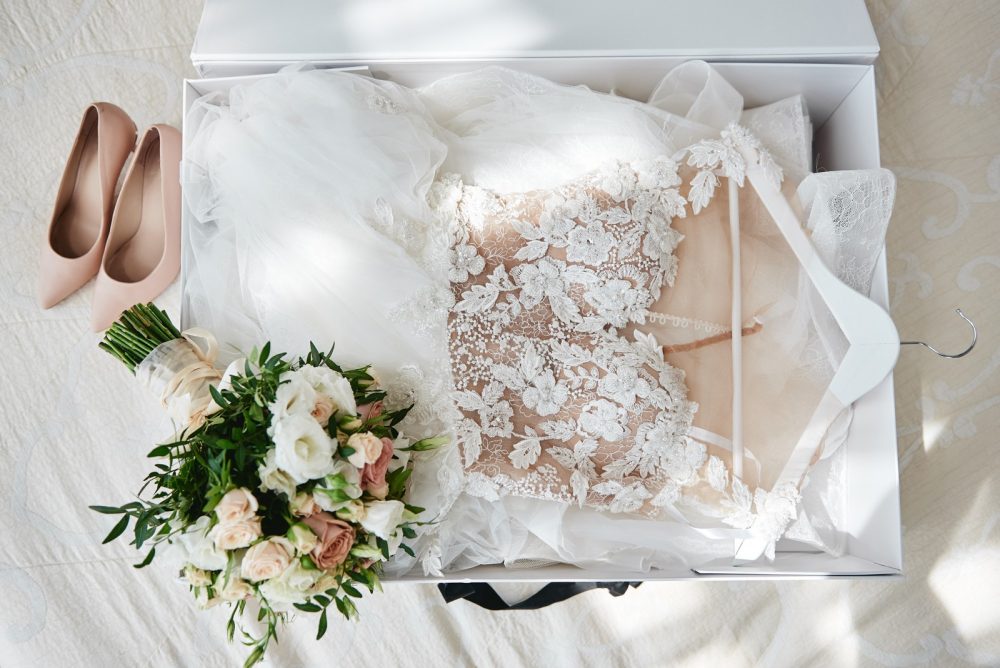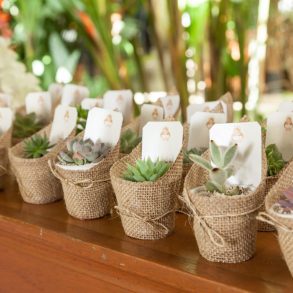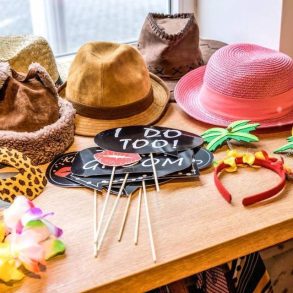While you are wedding planning, the thought probably never enters your mind about what to do with your wedding dress after the wedding. It seems like a weird thing to think about while you are in the midst of getting all the tiny details ironed out, but the truth is, you really should because it can have an impact on your budget. Of course, in today’s modern times, there are tons of things that you can do with your wedding gown after the big day. Here are a few examples: repurpose it into a cocktail dress, christening gown or lingerie, keep it in the closet, donate, sell, or get your wedding dress preserved.
If you are the sentimental type and want to hold onto your gown forever, you will want to look into preserving your wedding dress. Before you jump onto your favorite search engine to find a wedding dress preservation company, there are a lot of things that you should know about preserving your wedding dress. This guide will help you understand how to prepare your gown and what to expect from wedding gown preservation.
Why Should You Preserve Your Wedding Dress?
Many bridal boutiques use plastic garment bags to store your wedding dress. This is great because it can protect your gown from dust and damage while waiting for alterations or being stored for a short time. But for long term storage, this is the worst way to store your bridal gown.
The plastic garment bag can do more damage to your gown than you did while wearing it. Sure, it probably got a few stains from food or drinks, your hemline is undoubtedly going to be dirty, and there might even be a little makeup on it. A little unknown secret is that your wedding dress may have stains on it that are not visible to the eye (at least not right now). You see, there can be things that get on your gown that dry “clear.” No big deal, right? It’s clear no one can see it. Wrong!
Storing your wedding dress in a plastic garment bag will make these stains oxidize over time, which will cause them to turn brown and be harder to remove. Most plastic also gives off chemical fumes, which is what causes the fabric to become yellow. Expert Tip: Don’t get your wedding dress dry-cleaned and then go home and store it in the plastic garment bag. If you choose not to preserve your wedding dress, make sure to store it in a dark, cool place and make sure it is in a breathable garment bag.
When Should You Preserve Your Wedding Dress?
You may be tempted to leave your beloved bridal gown in the garment bag that the boutique provided hanging in your closet with good intentions to one day get it preserved. But you get busy with life and before you know it one week turns into four, then months go by, then years.
To best protect your wedding gown, it is imperative that you have it cleaned and preserved within a few days or weeks. If you are rushing off to your honeymoon, ask a family member or bridesmaid to drop it off at the local cleaners or ship it for you. If you wait too long to get it cleaned and preserved, you may not be able to remove the stains or discolorations that have set in.
Different Techniques for Cleaning Wedding Dresses
Wet-Cleaning
Some local dry cleaners use a “wet-cleaning” process to clean bridal gowns. This process is merely cleaning with water and has a lot of advantages.
- Wet-cleaning leaves no chemicals on your gown, which will help keep it in the best condition possible.
- It is the best cleaner for most food stains, sugar spills, and dirty hemlines.
- Wet-cleaning removes “sizing” from your fabric. Sizing is a starch-like substance that is added to bridal gowns during the manufacturing process. Removing the sizing can help protect your dress as it attracts mice & insects, and it can oxidize in stains and discolorations.
Note: Not all wedding dresses can be wet-cleaned. The type of fabric will have an impact on whether your gown gets wet or dry cleaned.
Dry Cleaning
Everyone is familiar with dry cleaning, but what you may not be familiar with are the chemicals used during the process and how they can impact your wedding dress. Here is a breakdown of the solvents dry-cleaners use.
Perchloroethylene
This is the most popular solvent that dry-cleaners use. This solvent is probably the best for silk, acetate, or rayon fabrics, but it can damage beading and sequins. Make sure your cleaner is skilled in protecting your beadwork if they plan to use this solvent.
Hydro Carbon (also referred to as Exxon DF-2000)
This is a relatively new petroleum-based solvent that is safer for sequins and beading but may not be as good at degreasing as the perchloroethylene is.
Greenearth
Greenearth is a reasonably new silicone-based solvent. Like Hydro Carbon, it is safer for your embellishments such as beading and sequins but is not as good at degreasing as perchloroethylene.

Dry Cleaning & Gown Preservation Are Not The Same Thing
It is essential to know that dry cleaning a garment and wedding dress preservation are not the same. During the preservation process, a specialist will create a plan of care for your gown that is based on the type of fabric, embellishments, stitching, and the types of stains. They take delicate care of your gown so that it returns to you in as pristine condition as possible.
Some local dry cleaners do offer wedding dress cleaning and some may even provide preservation. If you prefer to have your wedding gown cleaned and preserved locally, make sure that you contact the cleaner, ask questions about their process, and even take your gown to them to assess the damage, fabric, etc. If they seem a little uneasy with the design of your dress, do not leave it with them for cleaning or preserving.
Here are some essential questions to ask a local dry cleaner about preservation.
- Do they clean the gown in-house or ship it out to a company?
- Do they use a wet cleaning process or dry cleaning?
- If dry cleaning, what type of solvent does the cleaner use?
- Will the dress be cleaned by itself or along with other gowns?
- How much experience does the person that is doing the cleaning have with wedding dresses? And are they familiar with the type of fabric, lace, or beading on your gown?
- Is the dress insured by the cleaner during the process?
Things You Need To Do Before Preserving Your Wedding Dress
Before you ship your wedding dress off to be preserved, there are some things that you need to know. Make sure that you read the care label on the gown so that you understand what the designer and manufacturer suggest for cleaning your dress. You should also be aware of what type of fabric your gown is made of. Silk wedding gowns, for example, require a different level of care, and in many cases, if the silk fabric gets wet, it can be ruined. Knowledge is power and knowing what type of care your gown needs will help you when you are searching for the right dry cleaning or wedding dress preservation company.
Who is Cheaper National Preservation Companies or Local Dry Cleaners?
Prices for wedding dress preservation can vary based on your demographics, as well as at each individual local dry cleaner. You can expect to pay a minimum of $200 to simply clean your gown at a local cleaner (not including preserving it).
We have found several reputable national companies that will clean and preserve your gown for one set price. The Wedding Gown Preservation Co., for example, has been around since 1913 and has cleaned and preserved thousands upon thousands of dresses. You can generally purchase a kit at a local bridal boutique for approximately $250 (can vary by location). The kit includes instructions on how to package your gown and everything you need to ship the gown to them and back to you.
If you want to keep your bridal gown in a pristine condition to possibly have your daughter wear, or just for sentimental reasons, you definitely need to have your gown cleaned and preserved. If you are not emotionally attached and want to sell your wedding dress, click here.









